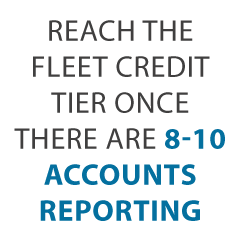- Connect With Us!
- (877) 600-2487
- info@creditsuite.com
BizSource and TrueSearch: Meet the Experian Business Credit Team
Published By Faith Stewart at August 27th, 2019
What Your Need to Know about the New Experian Business Credit Mighty Duo
There are three major players in the game of business credit reporting. They are Dun & Bradstreet, Experian, and Equifax. Often, Dun & Bradstreet gets all the glory. Experian business credit has recently stepped up their game however. The addition of two new team members, BizSource and TrueSearch, was a bold move. Who are these players, and how are they changing the game of business credit?
Meet BizSource: The Experian Business Credit Information Database
Experian combines its 30 years of database management experience with comprehensive commercial data to create a business intelligence database like no other. Its goal to be the number one source of business credit information, making BizSource the perfect name. It’s poised to become a heavy hitter in the game of business credit.
Meet TrueSearch: The Perfect BizSource Partner
TrueSearch is the new search and match technology that gives BizSource its power. Business credit reports differ from consumer reports in many ways, one of which is completeness. Credit reports for businesses tend to become spotty and hard to understand as companies change names, ownership, and affiliations. Throw in an address change now and then and it is a wonder any business can have a complete credit picture.
TrueSearch provides BizSource with complete, up to date information on businesses as reported. This makes sure the database has the most up to date, complete credit picture available for 19 million United States businesses. It also drops inactive trade lines after 36 months.
Hit the jackpot with our best webinar and its trustworthy list of seven vendors who can help you build business credit.
How Does TrueSearch Work Its Magic?
It all starts with the assigning of the BIN (Business Identification Number) that remains the same even with changing ownership and locations. Similar to a DUNS number from Dun & Bradstreet, it allows for consistent tracking over time. If there are multiple BINs assigned for some reason, they can combine into one business view to show the overall credit worthiness of the single company.
TrueSearch technology also combines variations of the business name and address into one record. Since it tracks variations over time, its matching technology provides depth of data and a more complete credit profile and score that has not previously been available from Experian. Regardless of the variation entered into the search, it will match up to the current record. The result is more useful information.
How Does this Experian Business Credit Team Change the Game?
Their powers combined, BizSource and TrueSearch are able to provide users with so much more. They can see more inquiry matches, more data, and improvement in data depth and accuracy. Another huge plus with these two on the team is the ability to put together data from more than one source into one file. In addition, it has the ability to blend both consumer and commercial data for small businesses.
The Rules of the Game
If you are not a regular spectator or participant in the business credit game, you can’t understand how any of this matters. You have to first understand the rules of the game. Then you can see how new players up the ante. If you don’t know anything about business credit, you are likely swimming in questions.
What is business credit? Why do I need business credit? Do I have business credit? How do I get business credit? Let’s start at the beginning.
What is Business Credit?
Business credit is a credit score for your business separate from your personal credit score. It is not associated with your personal finances at all.
Why Do I Need Business Credit?
If you borrow money for your business based on your personal credit, then your business finances will affect your personal credit score. You may think that is no biggie because you intend to handle your debts responsibly and make on time payments.
First, anything can happen. More than that however, making payments on time to business creditors does not keep your business finances from harming your personal credit. Business expenses are very large, and they can fill up a credit card fast. Cards connected to personal credit typically have lower limits than cards obtained with business credit. Business expenses can max out personal cards quickly.
Even if you pay them on-time, being at your max limit will lower your ratio of debt to your available credit. This ratio is a player in the credit score formula. If this number is too high, it will negatively affect your credit score despite on-time payments.
Also, if you already have poor personal credit, business credit can allow you to access the funds you need for your business anyway. If you have business credit, you will not need to rely on your personal credit to fund your business. Your business will be fundable on its own merit.
Do I Have Business Credit?
Now, if you are reading this as a business owner that has never thought of business credit before, you may be asking yourself if you have business credit. That depends. Let’s go through the steps necessary for establishing and building business credit and go from there.
Get in the Game: How to Establish Experian Business Credit (or Business Credit at All)
These steps will not only help you establish Experian business credit, but they will also help you establish business credit with other business credit reporting agencies.
Hit the jackpot with our best webinar and its trustworthy list of seven vendors who can help you build business credit.
Guard Your Man
This step is easier if done from the beginning, but it is possible to do it at any point. The goal is to separate your business from yourself. The first step to doing this is to incorporate. If you are operating as a sole proprietor or a partnership, you and your business are basically one and the same in the eyes of creditors. If your business owes money, you owe money, and vice versa. That means all payments on credit accounts get reported to your personal credit report.
By incorporating, you not only get some liability protection, but you also ensure that your business account payments get reported to your business credit report. You can choose to incorporate as a corporation, S-corp, or LLC. The level of protection and cost of each vary, but they all work the same for the purpose when it comes to establishing business credit.
Set Up the Shot
For the purposes of establishing and building business credit with all three reporting agencies, including Experian business credit, you have a few more things you need to do.
- Get an EIN. You can do this for free at IRS.gov. This is an identifying number that works similar to an SSN, but for your business. It will eliminate the need for you to use your SSN when applying for business credit. You may still need to provide it for the purposes of ensuring identification for fraud prevention.
- Your business address and phone number should not be the same as your personal address and phone number. The phone number should be through a toll-free exchange, and you need to have both listed in the directories under the business name.
- In today’s world, you cannot go without a business website. One that is unprofessional and poorly put together is just as bad as not having one at all. Use some marketing dollars to make sure your business website is well designed and user friendly.
Stay On Target
- Have a separate business email that is not from a free service such as Gmail or Yahoo. It should have the same URL as the company website.
- Open a separate business bank account. This not only helps separate your business for business credit purposes, but will help you keep your business finances separate from personal finances. The amount of time this saves come tax time is priceless.
- Apply for a DUNS number with Dun & Bradstreet. It is free on the Dun & Bradstreet website. They will try to sell you other services. You don’t need them and the number is free. Unlike Experian and Equifax, you cannot have a business credit score with Dun & Bradstreet without a DUNS number.
Get Off the Bench: Building Experian Business Credit, or Any Business Credit
To begin building business credit, you have to have timely payments on accounts reporting to the business credit agencies. If the account reports to Experian, your Experian business credit report opened with the first reported payment. Of course, it takes a little while to establish a pattern of on-time, consistent payments. After a bit however, your credit score will be established and start to grow.
The heck of it is, to get credit accounts that the creditors will report the payments on, you have to have good business credit, right? In general, yes, but we happen to know a few players to have on your team that can help you around this hurdle.
Hit the jackpot with our best webinar and its trustworthy list of seven vendors who can help you build business credit.
The Vendor Credit Tier
You definitely need the vendor credit tier on your team. It includes starter vendors that will extend net 30 invoice terms without a credit check, then report payments on those invoices to the credit reporting agencies. They do not all report to all agencies, so you need to work with several of them to get your credit established with each agency.
There are dozens of these “starter vendors” out there, but the easiest to get started with include:
Quill
Quill sells general office supplies that any business can use at pretty much any time. They may require you to make some initial purchases, but they will typically extend net invoice terms. Quill reports to Dun & Bradstreet. There is a $50 minimum payment to report.
Uline
Uline is a vendor of packing and janitorial supplies. They work much the same way as Uline, except they report to D&B and Experian business credit, so here is how to get your credit information listed with BizSource. They also require a $50 minimum to report.
Grainger
Grainger sells industrial and outdoor supplies, including tools. Every business can use a hammer and a screwdriver, right? They report to D&B and require a $50 minimum product purchase to report. If you do not have established business credit, you may need to submit business financials.
There are many others in addition to these, but this is a good start. Some require a minmum length of time in business. Others look for a particular amount of annual income. These three are easy to get started with right away, until you can meet the requirements for more in the vendor credit tier.
Experian Business Credit: Beyond the Vendor Credit Tier
You cannot build a whole business on credit from the vendor credit tier alone. To build your business credit higher and stronger, you will need to continue through the other credit tiers.
Retail Credit Tier
This tier includes store cards such as Amazon, Best Buy, Office Depot, and more. Once you have 5 to 7 vendor credit tier accounts reporting on-time payments, you should be able to qualify for some of these.
Fleet Credit Tier
The cards in the fleet credit tier pay for gasoline and automobile repairs. They come from companies such as Shell, Fuelman, and WEX. You can start applying for these after you have 10 or so accounts reporting from the retail credit tier.
Cash Credit Tier
This is the top tier that some consider elusive. It doesn’t have to be if you work through the other tiers first however. These are the standard Mastercard, Visa, and American Express cards that are not attached to a store. After you have enough accounts reporting from the fleet credit tier, you can apply for them. Cards in the cash credit tier often have higher limits and better rewards programs. Just be sure to continue paying on time to keep from ruining all your hard work.
With the Right Team Players, Anyone Can Build Business Credit
Just as Experian business credit has added BizSource and TrueSearch to their team, business owners have to put together a winning business credit building team. Once you have your business established as separate from your personal finances, you are ready to play the game.
Start recruiting in the vendor credit tier, and as soon as you start winning a few, you will see it is much easier to recruit new and stronger players. Before you know it, you will be able to taste victory.

 " class="attachment-blog-single size-blog-single wp-post-image" alt="Get Business Credit Cards for New Businesses Credit Suite-Business Line of Credit Decoded" title="Get Business Credit Cards for New Businesses">>
" class="attachment-blog-single size-blog-single wp-post-image" alt="Get Business Credit Cards for New Businesses Credit Suite-Business Line of Credit Decoded" title="Get Business Credit Cards for New Businesses">>
